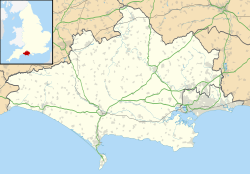| Durlston | |
|---|---|
 Houses on Durlston Road | |
Location within Dorset | |
| OS grid reference | SZ030778 |
| Civil parish | |
| Unitary authority | |
| Ceremonial county | |
| Region | |
| Country | England |
| Sovereign state | United Kingdom |
| Post town | SWANAGE |
| Postcode district | BH19 |
| Dialling code | 01929 |
| Police | Dorset |
| Fire | Dorset and Wiltshire |
| Ambulance | South Western |
| UK Parliament | |
Durlston is an area of Swanage, in Dorset, England. [1] The area was developed by George Burt as a residential suburb, and includes many large Victorian villas as well as modern developments.
